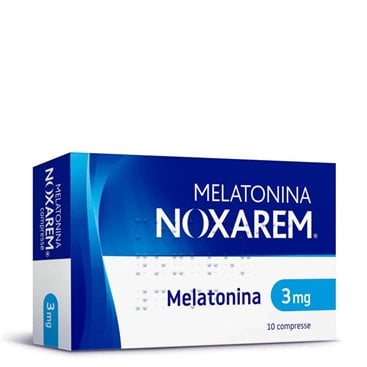Melatonin Noxarem 3 Mg 10 Tablets
Melatonin Noxarem 3 Mg 10 Tablets
Leaflet content
1. What Melatonin Noxarem is and what it is used for
2. What you need to know before you start taking Melatonin Noxarem
3. How to take Melatonin Noxarem
4. Possible adverse effects
Conservation of Melatonin Noxarem
6. Contents of the packaging and additional information
1. What Melatonin Noxarem is and what it is used for
The active ingredient in Melatonin Noxarem is melatonin, which belongs to a group of hormones produced by the body.
Melatonin is used for the short-term treatment of jet lag in adults. Jet lag refers to the symptoms caused by the time difference when traveling across different time zones, heading east or west.
You should see a doctor if it worsens or does not improve.
2. What you need to know before you start taking Melatonin Noxarem
Do not take Melatonin Noxarem:
- if you are allergic to melatonin or any of the other ingredients of this medicine (listed in section 6).
Warnings and precautions
Talk to your doctor or pharmacist before taking this medicine if you suffer from:
renal insufficiency. The use of melatonin is not recommended if you have severe kidney disease.
liver failure. The use of melatonin is not recommended if you have liver disease.
autoimmune disease (when the body is "attacked" by its own immune system). The use of melatonin is not recommended in this case.
cardiovascular condition for which you take antihypertensive medication. The use of melatonin is not recommended in this case.
The timing of melatonin dosing is important. Melatonin should be used as directed.
Melatonin can cause drowsiness. If you experience drowsiness you should be careful, as it can impair your ability to do things like drive.
Smoking can reduce the effectiveness of melatonin, as components of tobacco smoke can accelerate the breakdown of melatonin in the liver.
Children and adolescents
This medication should not be administered to children under 18 years of age, as it has not been evaluated in this age group and its effects are unknown.
Other medications and Melatonin Noxarem
Tell your doctor or pharmacist if you are taking, have recently taken or might take any other medicines. These medications include:
Fluvoxamine (used in the treatment of depression and obsessive-compulsive disorder), quinolones and rifampicin (used in the treatment of bacterial infections), estrogens (used in contraceptives or hormone replacement therapy), carbamazepine (used in the treatment of epilepsy) and 5- or 8-methoxypsoralen (5 and 8 MOP) (used in the treatment of skin diseases such as psoriasis).
Adrenergic agonists or antagonists (such as certain types of medicines used to control blood pressure through vasoconstriction, nasal decongestants, medicines that lower blood pressure), opioid agonists or antagonists (such as medicines used in the treatment of drug addiction), inhibitors prostaglandin (such as nonsteroidal anti-inflammatory drugs), antidepressant medications, tryptophan, and alcohol.
Cimetidine (used to treat stomach problems such as ulcers), calcium channel blockers (medicines used to treat high blood pressure and sudden chest pain [angina], such as nifedipine).
Benzodiazepines and non-benzodiazepine hypnotics (medicines used to induce sleep such as zaleplon, zolpidem, and zopiclone).
Thioridazine (for the treatment of schizophrenia) and imipramine (for the treatment of depression).
Warfarin and other anticoagulants, e.g. e.g. dabigatran, rivaroxaban, apixaban, edoxaban (used to prevent blood clotting) – INR may be needed to check more specifically.
Taking Melatonin Noxarem with food, drinks and alcohol
Food can alter the effectiveness of melatonin. It is recommended not to consume food 2 hours before or 2 hours after the scheduled time for taking melatonin. Melatonin may impair blood glucose control if taken shortly before or after carbohydrate-rich meals. If you have diabetes or any significant glucose intolerance, you should ideally take melatonin at least 3 hours after any meal.
Do not drink alcoholic beverages before, during, or after taking melatonin, as it reduces its effectiveness and has the potential to worsen certain symptoms of jet lag (such as headache, morning fatigue, problems concentrating).
Pregnancy and lactation
The use of this medication during pregnancy is not recommended. You should not use Melatonin Noxarem if you are breast-feeding.
Driving and using machines
Melatonin has a moderate influence on the ability to drive and use machines. Melatonin can cause drowsiness, among other things. Alertness (vigilance) may be affected for several hours after taking melatonin. Do not drive or operate machinery after taking melatonin.
3. How to take Melatonin Noxarem
Exactly follow the medication administration instructions contained in this leaflet or as directed by your doctor or pharmacist. If in doubt, ask your doctor or pharmacist.
The recommended dose is one 3 mg tablet per day for a maximum of 4 days. You should take your first dose when you arrive at your destination at your normal bedtime (local time). On the following days, you should also take the dose at the time you normally go to bed. If the standard 3 mg dose does not adequately relieve your symptoms, you can take a 5 mg tablet at your local bedtime instead of the 3 mg tablet. You should not take the 5 mg tablet in addition to the 3 mg tablet, but you can take the higher dose on subsequent days. The maximum daily dose is 5 mg once a day. You should take the dose that adequately relieves your symptoms for the shortest period.
The time you take melatonin is important, because if you take it at the wrong time, melatonin can cause drowsiness and delay adaptation to local time. Therefore, you should not take the tablets before 8:00 p.m. or after 4:00 a.m. The tablets should be taken with a glass of water. It is recommended not to consume food 2 hours before or 2 hours after the scheduled time for taking melatonin.
The 5 mg Melatonin Noxarem tablet can be divided into equal doses.
If you take more Melatonin Noxarem than you should
In case of overdose or accidental ingestion, or if a child accidentally ingests them, immediately consult your doctor or pharmacist or call the Toxicological Information Service, telephone 91 562 04 20, indicating the medication and the amount ingested.
Taking more than the recommended daily dose may make you drowsy.
If you forget to take Melatonin Noxarem
Do not take a double dose to make up for a missed dose.
If you stop treatment with Melatonin Noxarem
There are no known harmful effects from stopping or ending treatment early. There are no known withdrawal symptoms from the use of melatonin after completion of treatment.
If you have any further questions on the use of this medicine, ask your doctor or pharmacist.
4. Possible adverse effects
Like all medicines, this medicine can cause side effects, although not everyone gets them.
Possible adverse effects in short-term use for jet lag are: headache, loss of appetite, dizziness, daytime sleepiness, and disorientation.
Various adverse effects have been reported when using melatonin for other disorders.
If you experience any of the following serious side effects, stop taking the medicine and consult your doctor immediately.
Uncommon: (may affect 1 in 100 people)
Chest pain
Rare: (may affect 1 in 1,000 people)
Loss of consciousness or fainting
Severe chest pain due to angina
Feeling your own heartbeat
Depression
Vision problems
Disorientation
Vertigo (a feeling of dizziness or “spinning”)
Blood in your urine
Low white blood cell count in your urine blood
Low platelet count, which increases the risk of bleeding or bruising
Psoriasis
Frequency not known: (cannot be estimated from available data)
Hypersensitivity reaction
Skin swelling
If you experience any of the following non-serious adverse effects, consult your doctor and/or seek medical advice.
Uncommon: (may affect 1 in 100 people)
Irritability, nervousness, agitation, insomnia, strange dreams, nightmares, anxiety, migraine, headache, lethargy (tiredness, lack of energy), agitation associated with increased activity, dizziness, tiredness, hypertension, abdominal pain, indigestion, ulcers mouth, dry mouth, nausea, changes in blood composition that could cause yellowing of the skin or eyes, skin inflammation, night sweats, itching, rash, dry skin, pain in the extremities, glucose excretion in the urine, excess protein in the urine, menopause symptoms, feeling weak, liver failure and weight gain.
Rare: (may affect 1 in 1,000 people)
Shingles, high levels of fatty acid molecules in the blood, mood swings, aggressiveness, agitation, crying, stress symptoms, waking up too early, increased sexual desire, depressed state, memory problems, lack of attention, drowsy state , restless legs syndrome, poor quality sleep, tingling sensation, watery eyes, dizziness when standing up or sitting down, hot flashes, gastroesophageal reflux, stomach disorders, mouth sores, tongue sores, upset stomach, vomiting, bowel sounds abnormal, windiness, excessive saliva production, bad breath, abdominal discomfort, gastric disorder, inflammation of the gastric mucosa, eczema, rash, hand dermatitis, itchy rash, nail disorder, arthritis, muscle spasms, pain in the neck, night cramps, large volume of urine, urinating during the night, prolonged erection that may be painful, inflammation of the prostate gland, tiredness, pain, thirst, increased liver enzymes, abnormal blood electrolytes, and abnormal laboratory results.
Frequency not known: (cannot be estimated from available data)
Swelling of the mouth or tongue, hyperglycemia and abnormal milk secretion.
Leaflet Melatonin Noxarem 3 Mg 10 Tablets



